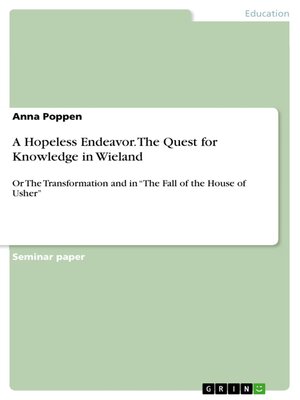A Hopeless Endeavor. the Quest for Knowledge in Wieland
ebook ∣ Or The Transformation and in "The Fall of the House of Usher"
By Anna Poppen

Sign up to save your library
With an OverDrive account, you can save your favorite libraries for at-a-glance information about availability. Find out more about OverDrive accounts.
Find this title in Libby, the library reading app by OverDrive.



Search for a digital library with this title
Title found at these libraries:
| Library Name | Distance |
|---|---|
| Loading... |
Seminar paper from the year 2008 in the subject Didactics for the subject English - Literature, Works, grade: 1,0, University of Göttingen, language: English, abstract: Gothic elements, spooky settings and supernatural incidents – these are some things that probably come to people's minds when they think of Charles Brockden Brown and Edgar Allan Poe. These features definitely appear in most of their stories, for example in Brown's novel Wieland; or The Transformation and in Poe's short story "The Fall of the House of Usher", which will play a major role in this work. When comparing the novel and the short story the reader's attention is attracted by several parallels between the two stories. The most striking common motifs, which have been pointed out and analyzed by many literary critics , are those of incestuous love and inherited madness. Although I won't focus on any of these issues in this work, it is always important to keep these parallels at the back of one's mind.
In the following I am primarily going to concentrate on questions of epistemology, which The Stanford Encyclopedia of Philosophy defines as "the study of knowledge and justified belief" (Stanford Encyclopedia 1). The Encyclopedia states that "[a]s the study of knowledge, epistemology is concerned with the following questions: What are the necessary and sufficient conditions of knowledge? What are its sources? What is its structure, and what are its limits?" (Stanford Encyclopedia 1) Here I'll mainly be concerned with the sources of knowledge and I will point out how the different characters in Charles Brockden Brown's novel Wieland; or The Transformation and in Edgar Allan Poe's short stories "The Fall of The House of Usher" and "The Sphinx" try to make use of these sources.
More precisely, I will argue that Charles Brockden Brown and Edgar Allan Poe show the limits of epistemology by creating characters who try to acquire knowledge through different approaches, but fail in the end. Both authors respond to their cultural and historical background and present a rather pessimistic view of the new American nation.
In the following I will very briefly describe the historical and cultural background of Brown and Poe's writings and explain to what extent the contents of Wieland, and "The Fall of the House of Usher" are influenced by and related to this background.







